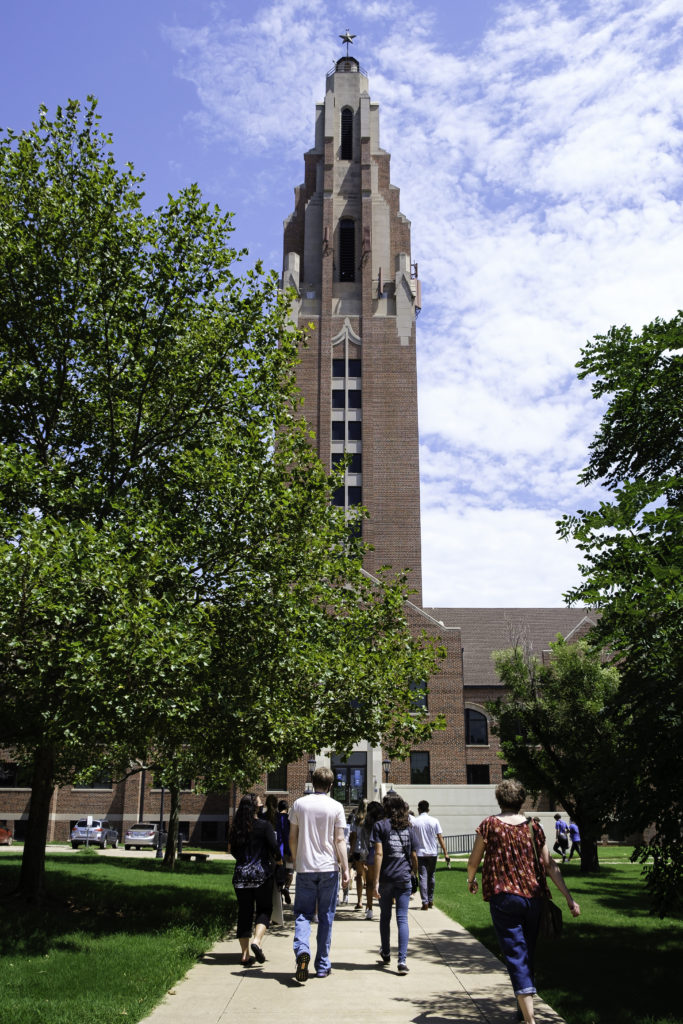
OCU will be visited by a peer review team from the Higher Learning Commission Feb. 28 through March 1. The OCU team preparing for this visit includes Dr. Adam Ryburn, Chair and professor of biology and assistant to the provost for accreditation. Dr. Ryburn spoke on the OCU Starbeat podcast about the accreditation process, criteria for accreditation, and how OCU has prepared for the HLC’s upcoming visit and review.
On the podcast, Dr. Ryburn said that the HLC is an independent organization that accredits degree-granting post-secondary institutions. It is one of six major accrediting bodies that work regionally in the US, according to accreditation standards provided by the US Department of Education. The HLC is the largest accreditation body, covering nineteen states.
“[Accreditation] provides legitimacy to OCU as an institution of higher education,” Ryburn said. If not accredited, federal financial aid for students, federal grants, and transfer credits to and from OCU would all be jeopardized due to a lack of institutional credibility.
The five criteria required for accreditation address aspects of the university such as its mission, policies, procedures, and evaluation methods. Dr. Ryburn explained each of the five criteria, and how OCU meets each one. To hear these criteria described in detail, five episodes of the Starbeat podcasts provide comprehensive and informative lessons on each. OCU’s 35,000-word assurance argument is also viewable online.
The first criteria requires that the “institution’s mission is clear and articulated publicly, and it guides the institution’s operations.” OCU’s mission established in 2017 is to “Prepare all learners to Create, Lead, and Serve.”
The HLC will examine the mission, as well as how the university implements the mission into operations. According to Dr. Ryburn, campus operations such as career services, university counseling, new student orientation, learning enhancement services, and disability services are all designed to aid in this mission preparation. Additionally, OCU’s efforts to impact its OKC community, become more visible to the community and promote Diversity, Equity, and Inclusion through a newly established department are all done to accomplish this mission.
The second criteria addresses institutional integrity, examining the ethical and responsible conduct of institutions. Dr. Ryburn said that OCU argues that its policies and procedures are “designed to promote responsibility in financial, fiscal, academic, and personnel matters.” Dr. Ryburn also said that OCU aims to act ethically by being “transparent and forthcoming with information” regarding all university programs.
The third criteria addresses the quality, resources, and support included with teaching and learning, examining whether the institution provides quality education regardless of the course’s location or delivery method. Dr. Ryburn said OCU ensures it is committed to “providing education that will enable students to achieve excellence.”
With shifts to online instruction, Dr. Ryburn said OCU has made efforts to ensure remote instruction parallels that of in-person instruction. This criterion also drives OCU’s commitment to staff training and measuring faculty retention rates.
The fourth criteria addresses evaluation and the improvement of teaching and learning. According to Ryburn, this criterion requires that the university implement assessment procedures and that OCU implements a review process by which all academic and co-curricular programs are evaluated over courses of three-year cycles. OCU looks at retention and graduation rates of all degree programs in these assessments.
The fifth and final criteria examines whether institutional resources, structures, processes, and planning are effectively used to fulfill the university’s mission. Dr. Ryburn said OCU has focused on budget allocation and enrollment management in this ten-year cycle and made progress in financial areas examined for accreditation.
When the HLC visits OCU, a team of five peer-reviewers will conduct a comprehensive evaluation of the university to verify the information presented in the assurance argument. This evaluation will be performed through meetings with members of faculty and staff, speaking with students, and examining university procedures. No classes will be disrupted by visitors. Two peer-reviewers from the HLC will visit the campus in person, and three peer-reviewers will attend virtually through Zoom and other remote methods.
OCU was first accredited in 1951 and is re-accredited according to a 10-year cycle. In Year 10 of this cycle, HLC visits occur, and reviews are conducted to determine accreditation status. Students are encouraged to become familiar with OCU’s arguments for meeting each criterion. A list of likely questions peer reviewers may ask students on campus is available online, and students may also become familiar with these and prepare potential answers.


Leave a Reply